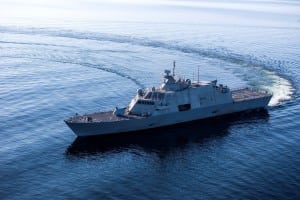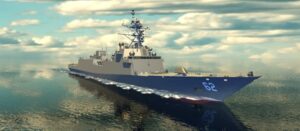A Navy official this week cited technical challenges as the reason behind the Navy’s decision to cancel development work on Raytheon Technologies’ [RTX] AN/SQS-62 Variable Depth Sonar for use on the
Freedom-variant Littoral Combat Ships and Constellation-class (FFG-62) frigates.
The sonar system, also called the Dual-mode Array Transmitter (DART), was previously chosen for the LCS with plans to also be used on the frigate to help perform the anti-submarine warfare (ASW) mission.

“So the plan for frigate had been to go with the DART sonar, the Raytheon product that had been selected for LCS. And that was a plan that was driven by the desire for commonality between the two classes in conducting ASW,” Rear Adm. Casey Moton, Program Executive Officer for Unmanned and Small Combatants (PEO USC), told reporters on Monday.
However, serious “technical challenges” came up, primarily “in the area of hydrodynamics in the sort of stability flowing through the water of the array, and also some issues with transducers both in reliability and performance,” Moton said.
While the Navy-industry team “did just a significant amount of work to attempt to retire those risks, but in the end…we made the call on LCS as well that we were not going to continue to pursue that sonar and so we stopped,” he continued.
The Navy first accepted the DART in late 2018 as one of four components in the ASW mission package for the LCS for further testing (Defense Daily, Dec. 5, 2018).
However, these major problems with the DART led to the Navy canceling the ASW mission package for the LCS entirely, one of the two major reasons the Navy decided to seek to retire nine Freedom-variant LCSs early in the fiscal year 2023 budget request (Defense Daily, April 25).
The Navy thereafter said the ASW mission will instead be moved to the FFG-62 frigate class using the Combined Active Passive Towed Array Sonar (CAPTAS-4). CAPTAS 4 is produced by Advanced Acoustics Concepts, a joint venture between Leonardo DRS and Defense and Security.
“So eventually, it just came to the point where the risk had gotten so much. And then we had some testing…that kind of caused us to have increased concern that we were not going to be able to solve the issues with the Raytheon sonar. So the shipbuilder had concerns, we certainly had concerns and we made the hard decision to stop that effort and to switch frigate to the CAPTAS,” Moton said.

He said this was the right decision and that the service is familiar with the sonar because it is also fielded on the FREMM frigate, the Constellation-class’s parent design.
“So we’re quite familiar with it, as well we looked at the integration aspects and made that decision in concert with the shipbuilder. And I think it’s going prove to be a good choice. And I think CAPTAS is going to give a great ASW capability to frigate when it delivers.”
Moton said the Navy had prepared for that outcome and looked at what it would take to switch sonars and did some alternative design work “to make sure that if we did have to switch, that we would not be starting from zero.”
He also confirmed any cost issues in switching from DART to CAPTUS will be managed within the program manager’s budget. While there were some efforts previously underway to integrate DART into the frigate ASW system and they had to stop and start over with CAPTAS, “it’s pretty close in terms of sort of cost per unit.”